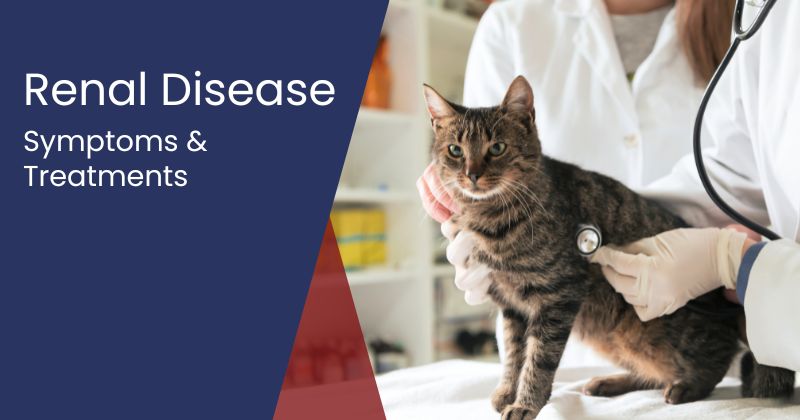
Did you know renal disease is a common health issue that can significantly impact your cat’s well-being? While it may seem overwhelming at first, knowing the symptoms and how to address them can help you provide the best possible care for your feline companion. Early detection and proper management are key to ensuring your cat remains comfortable and enjoys a good quality of life. Below, we’ll discuss the signs of renal disease in cats and the treatment options available to help you navigate this challenging condition with confidence. If you suspect your cat may be experiencing kidney problems, contact Rockdale Animal Hospital at (770) 922-8600 or request an appointment with one of our veterinarians.
Renal disease, commonly known as kidney disease, occurs when the kidneys lose their ability to filter waste and maintain proper fluid balance in the body. The kidneys play a vital role in regulating blood pressure, removing waste from the bloodstream, and maintaining essential electrolytes. When they fail to function properly, waste products accumulate in the body, leading to various health complications.
Renal disease in cats can be classified into two main categories: acute renal failure and chronic kidney disease (CKD). Acute renal failure happens suddenly, often due to toxin exposure or infection, and can sometimes be reversed with prompt treatment. Chronic kidney disease, on the other hand, develops gradually and is often irreversible, though it can be managed to slow its progression.
Identifying renal disease in its early stages can be difficult because the symptoms often develop slowly over time. Cats are known to hide discomfort, which can make early detection even more challenging. However, there are several key symptoms that can indicate your cat may be experiencing renal disease:
Renal disease in cats can be caused by various factors, many of which are beyond your control.
Chronic kidney disease is most commonly seen in older cats. As cats age, their kidneys naturally begin to wear down, making them more susceptible to renal disease.
Certain cat breeds, such as Persians, Maine Coons, and Abyssinians, are more prone to developing renal disease. If you have one of these breeds, it’s essential to monitor their kidney health closely as they age.
Bacterial infections, such as pyelonephritis, can damage the kidneys and lead to acute renal failure. In some cases, these infections can be treated, but they can also cause long-term damage.
Ingesting toxic substances like antifreeze, certain medications, or even plants like lilies can cause acute renal failure. These toxins directly damage the kidneys and can lead to life-threatening complications.
High blood pressure is both a cause and a result of kidney disease in cats. Elevated blood pressure can damage the kidneys over time, and in turn, renal disease can cause hypertension.
Chronic dehydration, whether from a lack of water intake or underlying medical conditions, can strain the kidneys and increase the risk of renal disease.
While renal disease in cats cannot always be cured, especially in chronic cases, there are several treatment options that can help manage the condition and improve your cat’s quality of life. Treatment will vary depending on the severity and stage of the disease.
Prescription diets designed for kidney support are lower in protein, phosphorus, and sodium, which helps reduce the strain on the kidneys and minimize toxin buildup. These diets are also often higher in omega-3 fatty acids to reduce inflammation. Consult your veterinarian before making any changes to your cat’s diet. They can recommend a diet tailored to your cat’s specific needs.
There are several medications available to help manage the symptoms of renal disease in cats. For instance, medications to lower blood pressure, stimulate appetite, or control nausea can help improve your cat’s quality of life. Additionally, phosphorus binders may be prescribed to reduce the absorption of phosphorus from food, which can slow the progression of kidney disease.
Cats with renal disease often suffer from dehydration, which can worsen their condition. Fluid therapy, either administered intravenously or subcutaneously, can help maintain proper hydration and support kidney function. In some cases, your veterinarian may recommend regular at-home fluid administration to keep your cat hydrated.
Regular veterinary exams, blood tests, and urine tests will help track your cat’s kidney function and adjust treatment as needed. Early detection of any changes can lead to better management of the disease.
Some pet owners explore alternative therapies, such as acupuncture or herbal supplements, to support their cat’s kidney health. While these treatments are not a replacement for conventional care, they may offer additional benefits when used in conjunction with veterinary treatment. Always discuss any alternative treatments with your veterinarian before proceeding.
Living with a cat that has renal disease can be challenging, but there are several ways to provide comfort and support. Here are some tips to help your cat feel their best:
Renal disease in cats is a serious condition that requires ongoing care and attention. If your cat has been diagnosed with renal disease, you can provide them with a better quality of life by staying informed and working closely with your veterinarian. At Rockdale Animal Hospital, we are here to help guide you through managing your cat’s renal disease. Call us at (770) 922-8600 or request an appointment.


